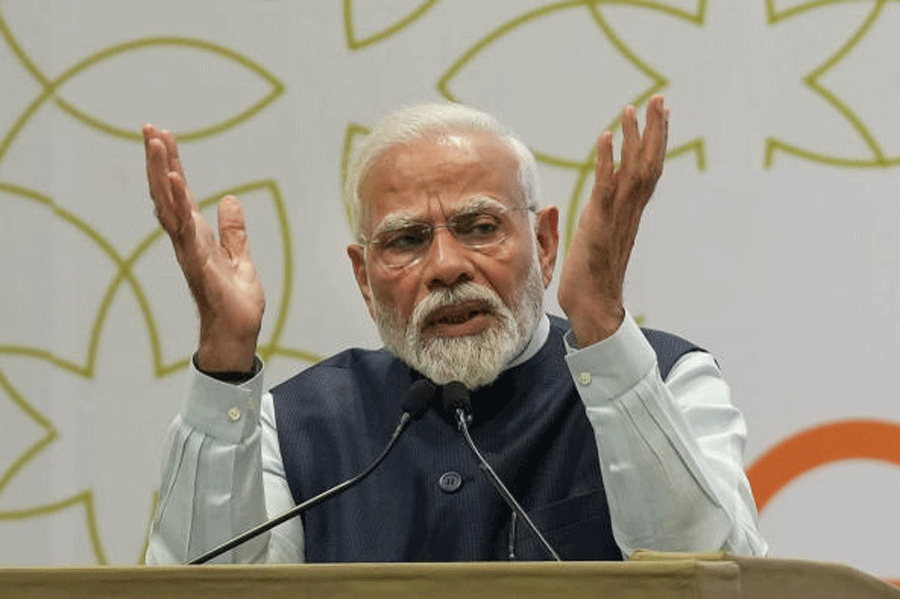Prime Minister Narendra Modi on Sunday launched a scheme to provide loans, training and marketing support to artisan communities, with Other Backward Classes leaders divided over the move.
Some of them welcomed the PM Vishwakarma scheme as a long-awaited welfare measure, but some said it would push the beneficiaries back into rigid caste-based occupations and deny them "real progress".
Both sides, however, underlined that certain Scheduled Caste communities that are not traditionally considered part of the Vishwakarma castes had been included in the new scheme.
Under the scheme, people involved in 18 specific trades would be eligible for loans up to Rs 3 lakh, at 5 per cent interest, to produce their goods. They will be provided with marketing support and training.
These 18 trades are those of carpenters (suthars/badhais), boat makers, armourers, blacksmiths, hammer-and-toolkit makers, locksmiths, sculptors (murtikars/stone carvers) and stone breakers, goldsmiths, potters, cobblers (charmakars/ shoesmiths/ footwear artisans), masons, basket/ mat/ broom/ coir weavers, doll-and-toy makers, barbers, garland makers, washerfolk, tailors and fishing-net makers.
Modi said the beneficiaries would be provided with toolkits worth Rs 15,000. First, they will receive a Rs 1-lakh loan. After repayment, they will get Rs 2 lakh more. They will not be required to give any guarantees to the banks. Applications can be made online.
“This scheme will not help people from the artisan castes lead comfortable lives. It will deny them real progress,” P.C. Patanjali, chairperson of the Most Backward Classes Forum, said.
“These people largely migrate from the villages to the cities to escape the stigma attached to their caste-based occupations, and to seek better lives and better education for their children. The new scheme will push them back into their (traditional) occupations in the villages and deprive their children of the possibility of quality education. They can neither become entrepreneurs nor become part of mainstream education or administration.”
Patanjali said that artisans were among the most socially backward OBCs and would have benefited more from initiatives for quality education and an exemption from the “creamy layer” screening in reservation.
He said the money being provided under the Vishwakarma scheme was too low to help the beneficiaries earn a decent income.
The scope for such traditional work has narrowed in the villages because of the use of technology, and it will be difficult to create a thriving market to support traditional artisans such as blacksmiths or sculptors, he added.
Patanjali said the government’s own 1993 order excluding the OBC “creamy layer” from reservation benefits had said that artisan communities should be identified and exempted from the “creamy layer” caveat, but this was never done.
“The government should have identified the artisan castes, exempted them from the creamy layer, and provided additional support through scholarships, residential schooling and coaching,” Patanjali said.
“The aspiring entrepreneurs should have been provided with help to acquire and use advanced technologies.”
He said the Vishwakarma castes include carpenters, blacksmiths, goldsmiths, masons and sculptors but not cobblers, broom and coir weavers, doll makers, barbers, washerfolk, tailors or fishing-net makers.
Several OBC groups have written to the government against the inclusion of these castes under the Vishwakarma scheme.
Hansaraj Jangra, president of the All India Backward Classes Federation, and Sanjay Harshwal from the Jangid Brahmin Mahasabha (an OBC rights group), welcomed the scheme.
“The government should have started this scheme at least a year ago, but better late than never,” Harshwal said.
Jangra acknowledged that the scheme’s launch might be related to the upcoming elections but said all parties did that.
“The scheme will benefit over 100 artisan castes even though some Dalit castes have been included,” he added.











